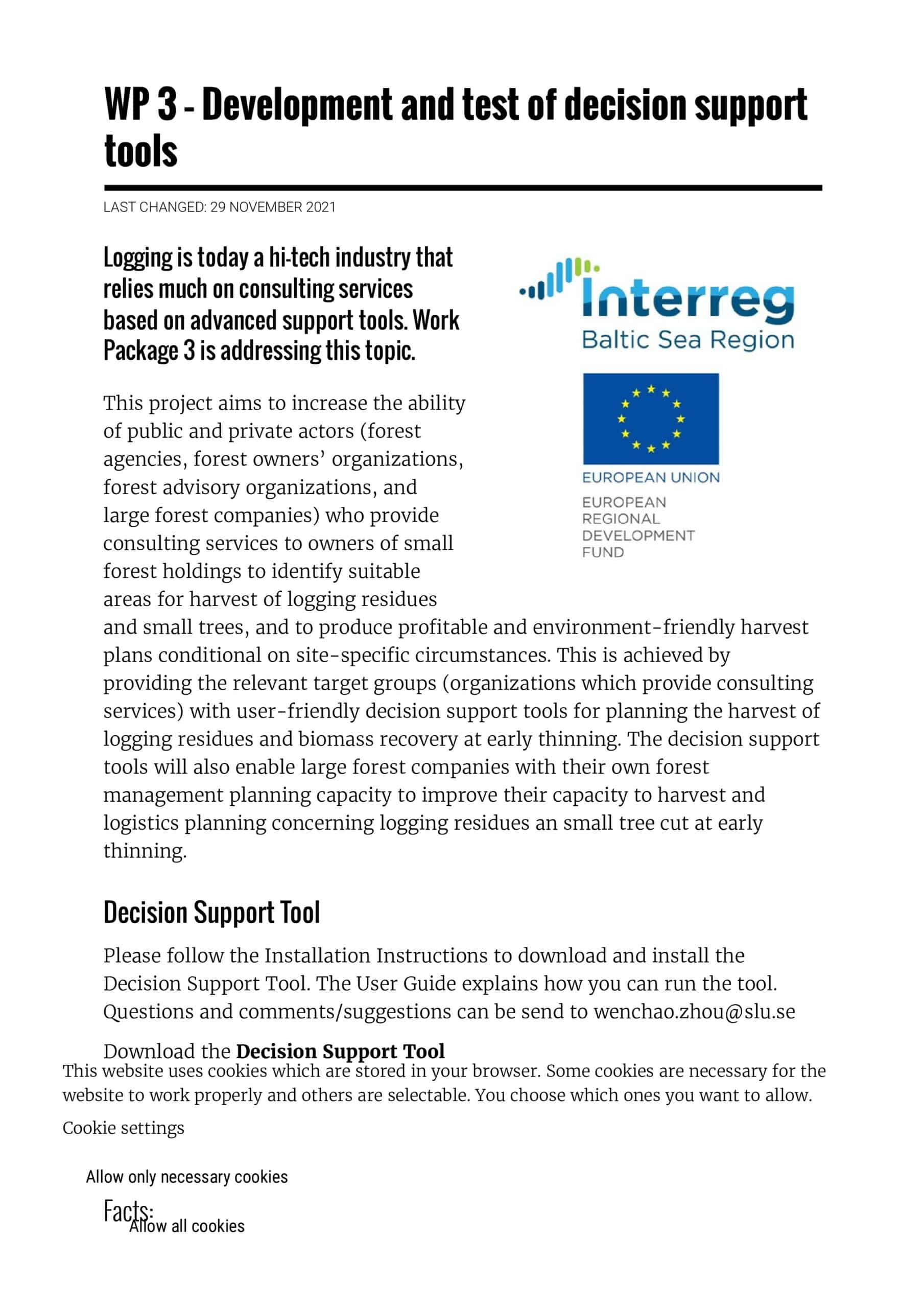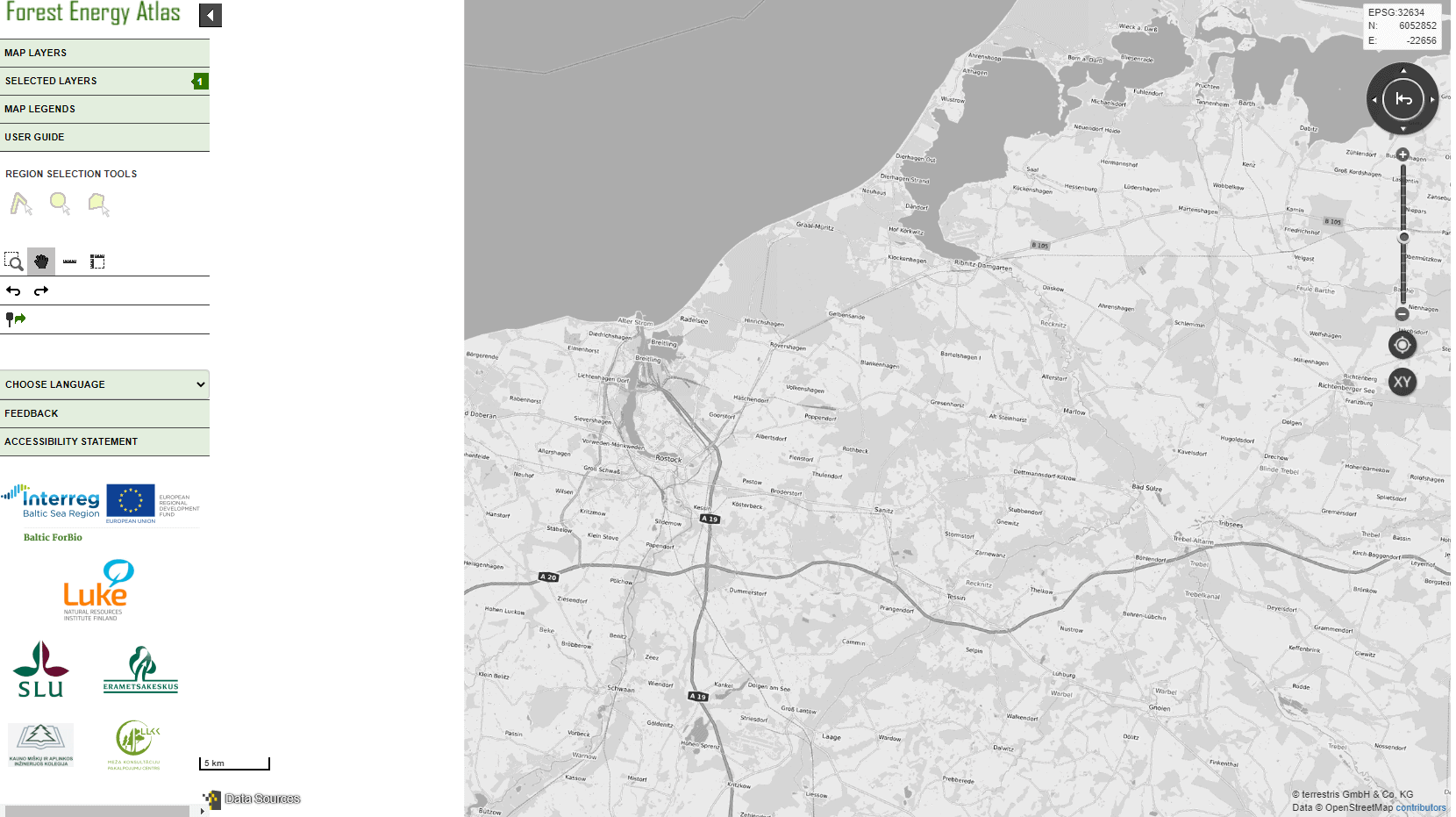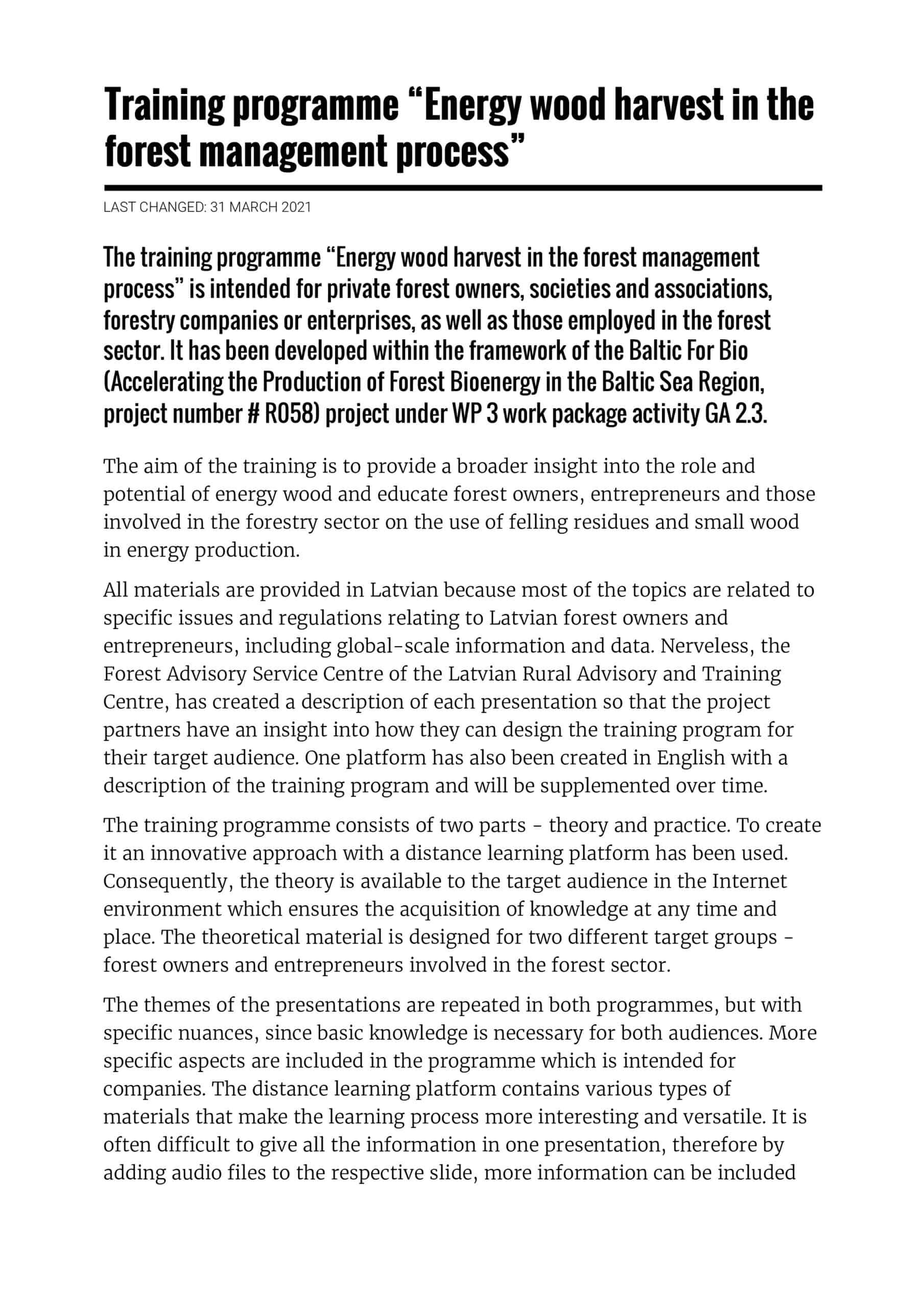Baltic ForBio
There is a growing demand for forest biomass from by-products of the wood industry to be used as a source of renewable energy. Targeted harvesting of wood biomass and evaluation of its bioenergy would trigger new business ideas for renewable energy production. The full utilisation of logging residues and small trees would increase production possibilities. Better collaboration between research and technology developers would lead to aligned approaches and concrete solutions in the field of forest bioenergy.
Besides, the development of small-scale bioenergy plants in rural areas would gear renewable energy production and sustainable development of the bionergy market in the Baltic Sea region. Facing such challenges as investment financing, suitable business models, and steady supply of biomass feedstock, the bionergy plants are experiencing tough conditions to increase their production.
The project intended to exploit logging residues, which are usually discarded after forest harvests, and small trees that are cut during forest thinning. Along with guidelines for using new technology, the project aimed to compile information on wood energy potential to shape innovative business models.
Budgets
in numbers
-
2.55MillionTotal
-
2.00MillionErdf
-
0.00MillionEni + Russia
-
0.00MillionNorway
Achievements
All in all, more than a hundred enterprises and public authorities from the six partner countries learnt about cost-effective and sustainable methods to harvest wood biomass, how to identify suitable areas for harvesting, as well to estimate the bioenergy potential of wood biomass. This knowledge should stimulate new business ideas for the production of renewable energy from local forest biomass.
Forest biomass as a source of renewable energy
The partners investigated the potential of local forest biomass for the production of renewable energy. They developed a forest energy atlas. It is a Geographic Information Systems (GIS) platform, combined with the biomass database, that enables spatial analysis and visualisation of biomass hotspots and attractive locations for investments in forest-based bioenergy production. The platform covers five Baltic Sea region countries Finland, Sweden, Estonia, Latvia, and Lithuania. This information is especially helpful for local and regional authorities as well as private companies that are interested in the availability of energy wood for bioenergy development projects. During the project, companies, forest management enterprises, as well as local and regional authorities from the project countries learnt how to use the platform for planning business decisions.
A user-friendly decision support tool developed
In addition, the partners developed and tested a user-friendly decision support tool for planning the harvest of logging residues and biomass recovery at early thinning. This tool helps forest agencies, forest owners’ organisations, and forest advisory organisations. The tools are valuable while consulting forest owners to identify suitable areas for the harvest of logging residues and small trees, and to produce profitable and environment-friendly harvest plans conditional on site-specific circumstances.
A new business model for small-scale bioenergy plants introduced
The project developed a business model for the sustainable development of small-scale bioenergy plants. The model included securing the supply of wood chips with required quality from local sources and financial and organisational aspects of establishing small-scale bioenergy plants. The project recommended establishing small-scale bioenergy plants as co-operative firms of local residents. Besides, the partners carried out a case study in German Altlandsberg, The case study showcased that co-operative ownership of infrastructure and technology within the supply chain, long term agreements between partners and choice of partners in the immediate neighbourhood seemed promising. The partners continued to use this knowledge e.g. for helping municipalities with heat supply and energy and climate plans.
Outputs
Decision support tool for harvest of logging forest residues as energy

Forest energy atlas

Training programme “Energy wood harvest in the forest management process”

Project Stories
Partners
Swedish University of Agricultural Sciences
- TownUmeå
- RegionVästerbottens län
- CountrySweden
- RepresentativePeichen Gong
- Phone
- E-Mail
- Web
Foundation Private Forest Centre (PFC)
- TownTallinn
- RegionPõhja-Eesti
- CountryEstonia
- RepresentativeKertu Kekk
- Phone
- E-Mail
- Web
Tartu Regional Energy Agency (TREA)
- TownTartu
- RegionLõuna-Eesti
- CountryEstonia
- RepresentativeMartin Kikas
- Phone
- E-Mail
- Web
Natural Resources Institute Finland
- TownHelsinki
- RegionHelsinki-Uusimaa
- CountryFinland
- RepresentativeMika Mustonen
- Phone
- E-Mail
- Web
Technical University of Applied Sciences Wildau (TUASW)
- TownWildau
- RegionDahme-Spreewald
- CountryGermany
- RepresentativeMareike Schultze
- Phone
- E-Mail
- Web
Ltd. Latvian Rural Advisory and Training Centre
- TownOzolnieki, Ozolnieki parish, Ozolnieki county
- RegionZemgale
- CountryLatvia
- RepresentativeRaimonds Bermanis
- Phone
- E-Mail
- Web
Kaunas Forestry and Environmental Engineering University of Applied Science
- TownKaunas district
- RegionKauno apskritis
- CountryLithuania
- RepresentativeDovilė Gustienė
- Phone
- E-Mail
- Web
The Forestry Research Institute of Sweden
- TownUppsala
- RegionUppsala län
- CountrySweden
- RepresentativeMaria Iwarsson Wide
- Phone
- E-Mail
- Web
The Swedish Forest Agency, SFA
- TownJÖNKÖPING
- RegionJönköpings län
- CountrySweden
- RepresentativeStefan Karlsson
- Phone
- E-Mail
- Web
Latvian State Forest Research Institute Silava
- TownSalaspils
- RegionRīga
- CountryLatvia
- RepresentativeAndis Lazdiņš
- Phone
- E-Mail
- Web
Regional Council Central Finland
- TownJyväskylä
- RegionKeski-Suomi
- CountryFinland
- RepresentativeHannu Koponen
- Phone
- E-Mail
- Web
Ueckermann Forest Service
- TownHohenbucko
- RegionElbe-Elster
- CountryGermany
- RepresentativeAxel Ueckermann
- Phone
- E-Mail
- Web
Castle property Altlandsberg GmbH
- TownAltlandsberg
- RegionMärkisch-Oderland
- CountryGermany
- RepresentativeRené Koht
- Phone
- E-Mail
- Web
-
Project managerPeichen GongSwedish University of Agricultural Sciences
-
Legal representativeCamilla WidmarkSwedish University of Agricultural Sciences
-
Financial managerAnn-Katrin IsraelssonSwedish University of Agricultural Sciences
-
Communication managerLaura EskelinenNatural Resources Institute Finland



